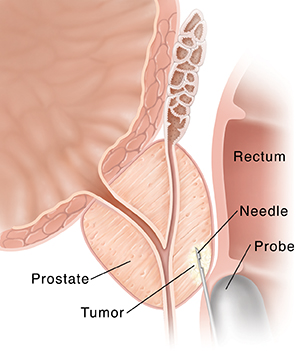Prostate Biopsy
Cancer occurs when abnormal cells form a tumor. A tumor is a lump of cells that grows uncontrolled. Early tests that may indicate cancer of the prostate include a digital rectal exam, a PSA (prostate specific antigen blood test), ultrasound, and others. A core needle biopsy will be done if your healthcare provider thinks you have prostate cancer. A thin needle is used to remove small samples of prostate tissue. Often a few biopsies are taken. These samples are checked for cancer.
Taking tissue samples
A biopsy takes about 15 to 20 minutes. You may be given an enema or suppository before the biopsy to clear the bowels. Antibiotics are given at least 1 hour before the biopsy. During the procedure:
-
You'll be given antibiotics to prevent infection.
-
You may be given a sedative, local pain killer, or pain medicine.
-
A small ultrasound probe is put into the rectum as you lie on your side. A picture of your prostate can then be seen on a screen. This is called a transrectal ultrasound (TRUS).
-
Your healthcare provider will use the TRUS picture as a guide. They'll use a thin needle to remove tiny tissue samples from some sites in the prostate.
-
These tissue samples are sent to the pathology department. They're looked at under a microscope so a diagnosis can be made.

Risks and possible complications of core needle biopsy
-
Infection
-
Blood in urine, stool, or semen
-
Pain
-
The biopsy misses the tumor
Home care
You may have had the biopsy done through your rectum, or through the skin between your scrotum and rectum. Your healthcare provider will tell you what to do after the biopsy. These instructions are based on your health condition, the type of biopsy, and your provider’s practices.
-
Your provider may give you pain medicine such as acetaminophen or ibuprofen for discomfort or pain. Follow your provider’s instructions for taking these medicines. Don’t take aspirin or ibuprofen after the procedure. If you have an ongoing (chronic) liver or kidney disease, talk with your provider before taking these medicines. Also talk with your provider if you’ve had a stomach ulcer or GI (gastrointestinal) bleeding. Let your provider know all the medicines you currently take.
-
You may need to take antibiotics for 1 to 2 days. This will help prevent an infection. Signs of an infection include chills, pain, or fever.
-
You may be told to drink 8 ounces of water every 30 minutes for 2 hours. This will help ease any discomfort. You can also take a warm bath. Or you can put a warm, damp washcloth over your urethra to help ease the pain.
-
You may see minor bleeding after the procedure. This is normal and often needs no treatment. You may see blood in your urine or semen (rust color). This may last for 1 to 2 months. You may also have light bleeding from your rectum if you have hemorrhoids. This can last up to 7-to 14 days.
-
When you pee you may go more often, feel burning, and see pink-tinged urine for up to 7 to 14 days after the biopsy.
-
Your provider will tell you when you can go back to your normal activities. This includes sex, exercise, and straining physically. Discuss these with your provider.
When to get medical advice
Call your healthcare provider right away if any of these occur:
-
You aren’t able to pee, with or without your bladder feeling full, or see that you have less flow of urine
-
Chills
-
Fever of 100.4°F (38°C) or higher, or as directed by your provider
-
Severe pain
-
Signs of an infection that's getting worse. These include worsening pain, pain in your side under the rib cage or in the low back, or bad-smelling urine.
-
Blood clots or bright red blood in your stool or urine
-
You feel confused or very tired
-
Your lower belly feels firm over your bladder area
© 2000-2024 The StayWell Company, LLC. All rights reserved. This information is not intended as a substitute for professional medical care. Always follow your healthcare professional's instructions.